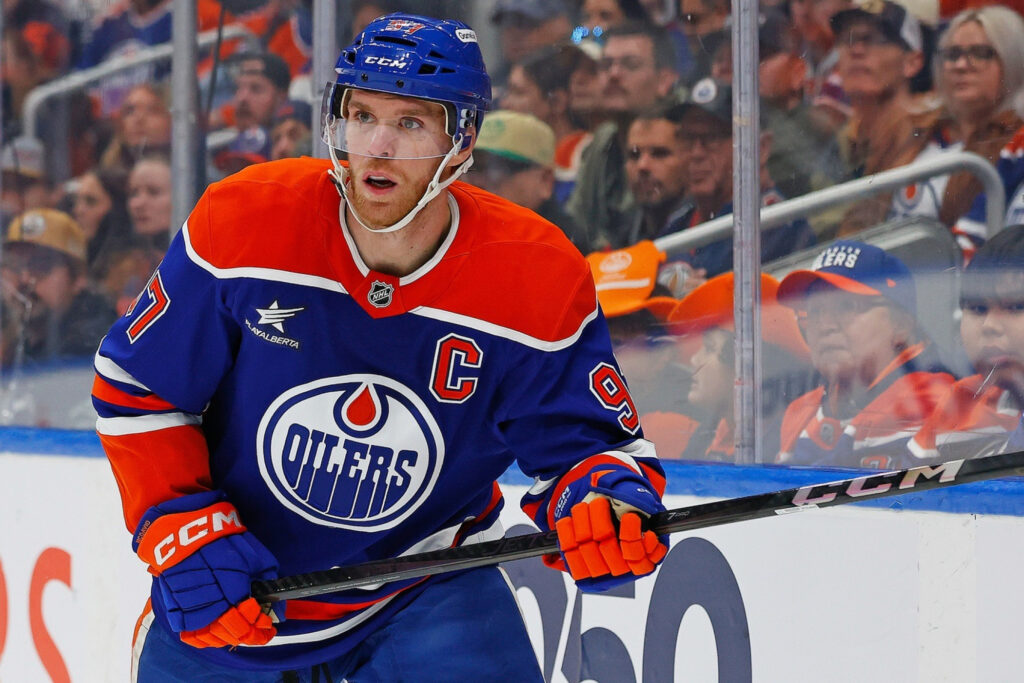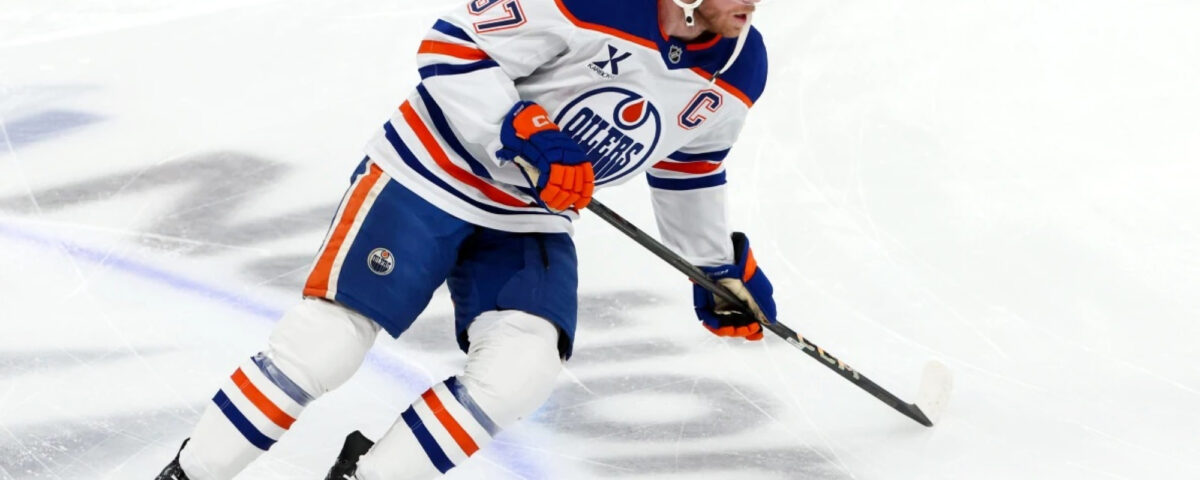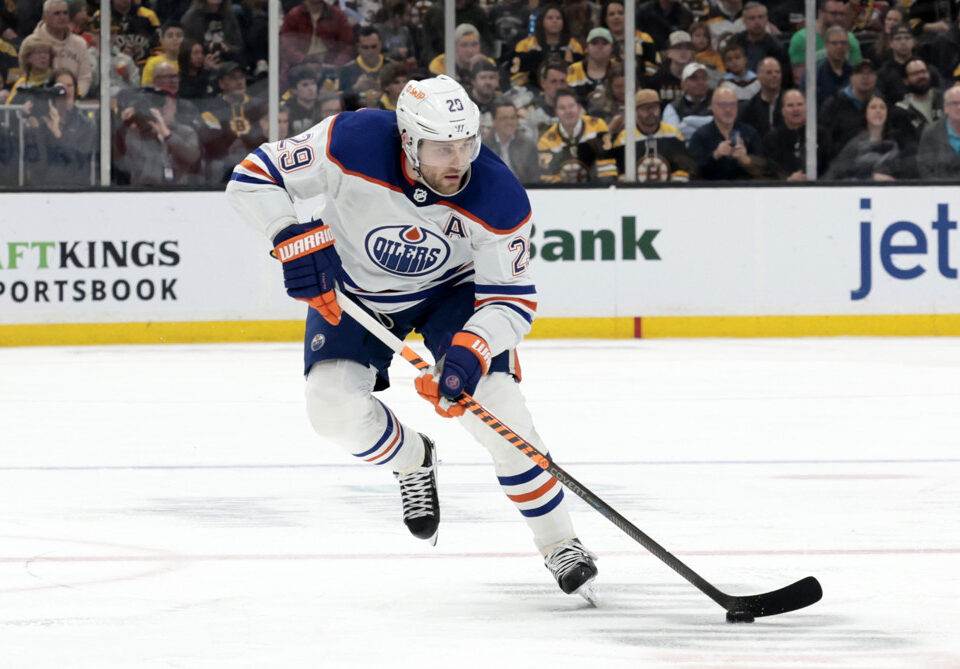
Klingberg signing adds intrigue to Oilers trade deadline plans
January 17, 2025
Darnell Nurse should move to the wing
January 24, 2025January 21, 2025 by Ryan Lotsberg
Connor McDavid was suspended for three games for his cross-check to the head of Conor Garland during Saturday’s game between the Edmonton Oilers and the Vancouver Canucks.
Garland was purposely holding McDavid in an effort to keep the league’s best player out of the play and prevent him from being involved in a potential game-tying goal during the dying seconds of the game. The two players became entangled with twenty seconds left on the clock. McDavid was able to escape Garland’s grasp with six seconds left in the game. Garland held McDavid for fourteen seconds without a referee raising his arm to call a penalty. McDavid responded to Garland’s tactic by cross-checking him in the head.
McDavid absolutely deserved a suspension without a doubt. You can’t target a player’s head with your stick. It was plainly evident that McDavid acted out of anger. The length of the suspension has drawn a boisterous reaction from Oilers fans though.
Tyler Myers laid a body check on Evan Bouchard while McDavid and Garland were entangled. The whistle went, and Myers and Bouchard approached each other slowly. Unprompted, Myers cross-checked Bouchard in the face. Myers was also suspended for three games.
You could argue that Myers’ act was worse than McDavid’s act because McDavid at least had a legitimate reason to be angry at his target. Perhaps Myers saw what McDavid did and responded in kind, I don’t know. This argument is just the tip of the iceberg though.
Auston Matthews was suspended two games for cross-checking Rasmus Dahlin in the head after Dahlin delivered multiple cross-checks to Matthews that kept him out of a play in a game on March 13, 2022.
The events that preceded these two incidents were slightly different, but both situations involved a player going beyond a legal level of physicality to intentionally interfere a star player from being involved in a play. Both McDavid and Matthews responded by cross-checking their opponents in the head. I don’t understand why it was a two-game suspension for Matthews but a three-game suspension for McDavid. There is no reasonable justification for the difference there.
Alex Pietrangelo was suspended for one game for swinging his stick at Leon Draisaitl’s arm as if his stick was an axe in Game 4 of the second round series between the Oilers and the Vegas Golden Knights in 2022. Draisaitl hadn’t even done anything to Pietrangelo to warrant that reaction. Pietrangelo was just upset that the Oilers had been really physical with him throughout the series, and he targeted Draisaitl out of frustration. Sure, a playoff game might be worth more than a regular season game, but it was a premeditated attack on another player that was seemingly rooted in frustration. I thought the suspension levied to Pietrangelo was too short due to the predatory nature of his act.
McDavid got three games for a retaliatory stick infraction. The fact that retaliation is always met with stiffer punishments than the original infraction infuriates me to no end, which is a rant for another day. I fail to see how McDavid’s infraction warranted a heavier suspension than Pietrangelo’s, regardless of what weight you want to give to playoff games.
The NHL’s Department of Player Safety has always had a poor reputation for their lack of consistency in discipline. These three suspensions uphold that reputation in my opinion. McDavid’s suspension should’ve been two games rather than three.
McDavid’s incident has also brought the quality of officiating into question. Let’s just leave the identity of the player out of this for a second. A player intentionally decided to hold another player for fourteen seconds as a way to keep him out of the play. The holding was wrestling-style in the middle of the ice. It was not a normal style of defending in hockey. The referees allowed this to happen for fourteen seconds. That’s inexcusable.
Let’s consider the context of the moment in the game when this happened. The Edmonton Oilers were trailing the Vancouver Canucks by a goal in the dying seconds of a game. The referees chose to not call a penalty on a clear and obvious infraction that prevented another player from being involved in the play. Calling a penalty would have put the Oilers on a powerplay, which could have altered the result of the game.
THAT SHOULDN’T MATTER! The final seconds of a hockey game shouldn’t be like The Purge. The time on the clock shouldn’t dictate the legality of actions. All I want is for the rulebook to be called regardless of when it happens. It was holding. It was interference. Whatever you want to call it, Garland committed an infraction and it should have been called a penalty.
A referee’s job is to enforce the rules of the game and to keep players safe. Nowhere in their job description does it say to make judgments based on the score of the game.
Whether we like it or not, the decisions of the referees influence the results of games. Powerplays can change games, and referees use their judgment to award them. Other judgment calls can impact whether goals stand or get disallowed. The referees play a role.
Having said that, referees shouldn’t act as if their decisions DIRECTLY decide games. That becomes a problem in instances like we saw in Saturday’s game between the Oilers and the Canucks. I don’t know why referees Wes McAuley and Chris Lee didn’t give Garland a penalty, but many people are saying it was because they didn’t want to impact the outcome of the game.
If that’s the case, then it’s bullshit. If that is what was going through their heads, then it’s a blatant example of acting like their decisions directly decide games. The outcome of Saturday’s game might have changed if the referees had assessed Garland a penalty; but it also might NOT have changed. It would’ve been up to the players on the ice to decide it.
The only decisions that referees should make are about whether or not a player committed a rules violation. That is the only piece of context that should matter. It doesn’t matter how much time is on the clock, what the score is, what day the calendar says it is, how warm it is outside, or how many penalties each team has had in the game. Call the damn rulebook.
Garland understood that there wasn’t a lot of time left in the game, so any penalty called against him would have a minimal impact. He took a strategic gamble that the referees wouldn’t call a penalty on him or that his team would have killed off the short powerplay. It was actually kind of smart by Garland given what we consistently see from officials in the NHL. It’s the type of underhanded, greasy play that makes opponents hate him and teammates love him. It paid off for Garland this time.
Many people have argued that McDavid wouldn’t have cross-checked Garland if a penalty had been called because Garland would’ve released McDavid before his temper boiled over.
That may or may not have been true. It would’ve been a delayed penalty in a six-on-five situation, so the Canucks might never have touched the puck and the whistle might never have gone, which would not have changed the result. However, had an arm gone up, the Oilers probably would have just given the puck to the Canucks to get the whistle, and Garland’s hold might have been released sooner.
McDavid likely wouldn’t have reacted the same way if Garland had let go sooner… or maybe he would have because of the intensity of the moment. We don’t know when McDavid decided he was going to cross-check Garland. He could’ve made that decision after being held for five seconds rather than fourteen seconds for all we know. I personally doubt that was the case because there was enough time left on the clock to make a play had McDavid been released sooner; but with six seconds left, he decided to stand up for himself.

Related: Connor McDavid celebrates his birthday with historic goal
Let’s consider the identity of the player now. McDavid is the best player in the world. The referees let the best player in the world be held for fourteen seconds. There’s a conversation to be had about protecting the league’s top assets, which are its star players.
Part of me wants to say that nobody deserves special treatment. A penalty is a penalty no matter who is involved. They’re all people, and their safety should be treated with equal value.
I also understand the merit of protecting star players though. They sell a lot of tickets and merchandise for the league, so the league should do what it can to protect them.
Garland’s hold should have been called a penalty, even if it was the worst player in the league that he was holding. However, there should have been ZERO doubt about making that call because it was the league’s best player. It’s awful that those referees let any player be treated like that, but it was ridiculous that they let that happen to the league’s best player.
David Staples and Jason Gregor both shared stats that show that the best players in the NHL are not drawing very many penalties. This goes beyond McDavid. It impacts star players on every team.
Skilled players that have the puck more should logically be more prone to drawing more penalties, especially when those players have superior speed. They are far more likely to have stick fouls committed against them. The numbers don’t reflect that logic though.
There’s a rhetoric out there that referees don’t want to call every single infraction against star players like McDavid because their teams would get far too many powerplays and there would be limited five-on-five time in games.
Once again, I’ll go back to my argument about calling the damn rulebook. A penalty is a penalty, no matter the circumstances. If a team has already had ten powerplays and they commit an eleventh infraction, then they should be given an eleventh penalty.
I understand personal biases. Fans of certain players and teams usually feel that their players and teams get screwed by the referees. I’m an Oilers fan, and McDavid is my favourite player; but that bias is not impacting my opinion here. The penalties that Nathan MacKinnon and Auston Matthews draw with their speed and skill should be called as well.
At an absolute minimum, the blatantly obvious ones should be called! The Garland hold was a blatantly obvious one. If you want to let the teeny tiny ticky tack stick infractions go, then fine; but being held for fourteen seconds should be a no-brainer to call, even if it was Quinn Hughes being held by McDavid.
The NHL sure has a funny way of increasing goal scoring. They let players get away with infractions against stars, which makes it harder for them to produce offence. It also limits the amount of powerplay opportunities that teams get, which in turn limits goal scoring.
I’m honestly more frustrated at the non-call on Garland than I am about the three-game suspension. Maybe the extra game is karma for McDavid getting away with the elbow on Marcus Johansson last week. The amount of movement of McDavid’s elbow was hard to make out, but he clearly didn’t try all that hard to avoid the contact. I don’t think it was a dive at all. The video clearly shows McDavid’s elbow making contact with Johansson’s chin, and his head movement reflected that contact. He has a concussion right now, so I really don’t think any of it was theatrics by Johnasson.
At the end of the say, I just want fair and consistent officiating and handling of supplemental discipline by the DOPS. It’s fair to say that those things are lacking.



1 Comment
Great article. NHL is so horribly inconsistent with calling their own rulebook. It’s almost like they are trying to suppress new fans from loving the sport.